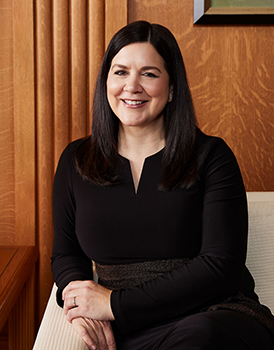
The awards, which commemorate the trailblazing legacy of Chatelaine magazine editor Doris Anderson, celebrate Canadians who exemplify the grit and ingenuity, two characteristics often used to describe Anderson.
The iconic Canadian magazine announced the awards earlier this month. York grad Birgit Uwaila Umaigba (MEd ’18, BScN ’16) leads the list of recipients of the award, and Osgoode Hall Law School grad Michelle O'Bonsawin (LLM ’14) received an honorable mention.
The two York grads were named among a 2022 cohort that includes such luminaries as Canadian politician Anita Anand and Olympian Marie-Philip Poulin.
Birgit Uwaila Umaigba

Umaigba was named a Doris Anderson Award recipient for elevating the voices of Canadian nurses on the front lines of pandemic care. Umaigba has a masters of education and a bachelor of science in nursing from York University.
Throughout the COVID-19 pandemic, Umaigba was on the front line highlighting to the media the stories and struggles of Canadian nurses. A clinical instructor and professor at Centennial College’s nursing program, Umaigba has an intimate understanding of the issues Canada’s nursing sector faces.
As a new mother, clinical instructor and master’s student, Umaigba decided to work as an agency nurse while she juggled the many demands in her life. Agency nurses work outside the facilities where they are employed and have no benefits, paid sick days or job security. During the pandemic, she became well known as she spoke out about the challenges that health-care workers and in particular, agency nurses, faced during the pandemic.
Through her advocacy, Umaigba has raised awareness about how racialized and poor communities have borne the brunt of the pandemic, the mental health struggles nurses face and the injustice of Ontario’s Bill 124.
Michelle O'Bonsawin

In 2022, O'Bonsawin became the first Indigenous justice named to the Supreme Court of Canada. A member of the Abenaki First Nation of Odanak, she's a champion of using Gladue principles – a judicial approach that takes into consideration Indigenous oppression.
With a distinguished legal career that has spanned more than 20 years, O’Bonsawin is a highly respected jurist. She was first appointed to the Ontario Superior Court of Justice in Ottawa in 2017. Prior to her appointment, she was general counsel for the Royal Ottawa Health Care Group for eight years. In this role, she developed a thorough understanding of legal issues related to mental health and performed significant research regarding the use of Gladue principles in the forensic mental health system, appearing before various administrative tribunals and levels of courts, including the Human Rights Tribunal of Ontario, the Consent and Capacity Board, the Ontario Review Board, the Ontario Superior Court of Justice, the Ontario Court of Justice, and the Ontario Court of Appeal.
She began her legal career with the legal services at the Royal Canadian Mounted Police and was then counsel with Canada Post, specializing in labour and employment law, human rights, and privacy law. O’Bonsawin has taught Indigenous law at the University of Ottawa’s Common Law Program and was previously responsible for the Indigenous Relations Program at the Royal Ottawa Health Care Group. She is a frequent guest speaker on Gladue principles, Indigenous issues, as well as mental health, labour and privacy law.
More about the Doris Anderson Awards
In 2021, Chatelaine magazine renamed their annual Women of the Year honours to celebrate Doris Anderson, who began as the magazine's senior editor in 1957. Over the course of her 20-year tenure as editor of the magazine, Anderson became well-known for her her tenacity, grit and determination. In her vision for Chatelaine, Anderson set out to create a women’s magazine that gave its readers information to re-imagine their lives, moving away from the "perfect, little hem-stitched housewife" that magazines during the 1950s were urging woman to be. Instead, Anderson published features on abortion, birth control and reproductive rights, equal pay, universal childcare and more, long before many of these topics were covered by other forms of media. Anderson died in 2007, the awards commemorate her enduring legacy.
